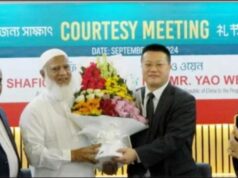In little over a week from now, the world’s high table for battling climate change, Conference of Parties (COP), will converge in the United Arab Emirates.
The COP28 meeting happens in extremely difficult circumstances. Not only is the global economy in doldrums, the world is beset with geopolitics and breakout of regional wars. At the same time climate change is gaining ground, manifesting in bouts of extreme weather and global warming.
For all countries including India this environment will be difficult to negotiate. Like other countries in the Global South, India has big stakes in the outcome of COP28.
Over the last decade and more India’s climate diplomacy has reinvented itself. It no longer approaches global conversations with defensive propositions. Instead, it has cast itself as being part of the solution—which in turn has created the space for diplomatic negotiations. Something that enabled it to generate consensus at the recent summit meeting of the G20 group of countries in New Delhi.
Can Indian climate diplomacy hold its own in Dubai too? It has already demonstrated adroitness in joining and creating new mechanisms to negotiate low-carbon transitions.
To answer this I spoke to Constantino Xavier, Fellow, Centre for Social and Economic Progress (CESP).




